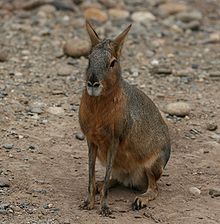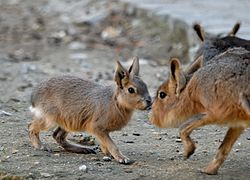Patagonian mara
Patagonian mara
Jump to navigation
Jump to search
| Patagonian mara Temporal range: Pleistocene - Recent | |
|---|---|
 | |
| At Temaikèn Zoo, Argentina | |
Conservation status | |
 Near Threatened (IUCN 3.1)[1] | |
Scientific classification | |
| Kingdom: | Animalia |
| Phylum: | Chordata |
| Class: | Mammalia |
| Order: | Rodentia |
| Family: | Caviidae |
| Genus: | Dolichotis |
| Species: | D. patagonum |
Binomial name | |
Dolichotis patagonum (Zimmermann, 1780) | |
 | |
| Patagonian mara range[2] | |
The Patagonian mara (Dolichotis patagonum) is a relatively large rodent in the mara genus (Dolichotis).[3] It is also known as the Patagonian cavy, Patagonian hare or dillaby. This herbivorous, somewhat rabbit-like animal is found in open and semi-open habitats in Argentina, including large parts of Patagonia. It is monogamous, but often breeds in warrens that are shared by several pairs.
Contents
1 Description
2 Ecology and activity
3 Social behavior and reproduction
4 Status
5 References
6 Further reading
7 External links
Description[edit]
The Patagonian mara resembles a jackrabbit.[4] It has distinctive long ears and long limbs. Its hind limbs are longer and more muscular than its forelimbs and it has a longer radius than humerus.[5] The feet are compressed, making them hoof-like. The forefeet have 4 digits while the hind feet have 3 digits. Its tail is short, depressed and is hairless.[5] It has a gray dorsal pelage with a white patch on the rump separated from the dorsal fur by a black area.[6] In addition, the mara has a white underside with a somewhat orange flank and chin.[5] The mara has a head and body length of 69–75 centimetres (27–30 in) with a tail of 4–5 centimetres (1.6–2.0 in). It weighs 8–16 kilograms (18–35 lb). Unlike most other cavids, the anal glands of the mara are between the anus and the base of the tail rather than being anterior to the anus.[5]
Ecology and activity[edit]

Mara foraging
The Patagonian mara is found only in Argentina. It ranges from 28ºS to 50ºS. Maras prefer to live in habitats with lots of shrub cover. However they also inhabit overgrazed and barren soils in the Monte Desert biome.[5] In northwestern Argentina the mara primarily inhabits lowland habitats like forest and creosote bush or larrea. Maras prefer sandy and low shrub habitat in Valdes Peninsula.[5] It has adapted well to a cursorial lifestyle on the open plains and steppe, with its long legs, reduced clavicle and well-developed sensory organs making it capable of running and communicating in these open habitats. When running, maras have been compared to deer and antelope.[4] Maras are largely herbivorous. They feed primarily on green vegetation and fruit. In the Monte Desert, monocots make up 70% of its diet while dicots make up 30%.[7] Preferred grass species eaten are those of the genera Chloris, Pappophorum and Trichloris while dicots that are eaten include Atriplex lampa, Lycium and Prosopis.[7]
Maras are primarily diurnal and around 46% of its daily activities involve feeding.[8] The temporal activity rhythms of maras are related to environmental factors.[9] Light, precipitation and temperate have a positive effect on annual activities while darkness and relative humidity have a negative effect. The daily activity of the mara is unimodal in winter and biomodal in other seasons.[9] The preferred temperature of the mara is around 20 °C (68 °F)C.[9] Females spend more time feeding than the males, due to the demands of gestation and lactation. Males spend most of the day sitting, being vigilant for predators.[8] Predators of maras, particularly the young, are felids, grisons, foxes and birds of prey.[8] Mara are also hosts for parasites like the nematode worm Wellcomia dolichotis.[5]
Social behavior and reproduction[edit]

Mara pair with young
The social organizations have a unique combination of monogamy and communal breeding.[10] Being monogamous, pairs of maras stay together for life with replacement of partners only occurring after its death.[11] The male has almost the sole responsibility in maintaining the pair by following the female wherever she goes.[8] A male will mark his female with urine and mark the ground around her with secretions from his glands and with feces, making the grounds around the female a mobile territory.[11] Pairs will breed together alone or with other pairs in warrens shared by up to 29 pairs.[10] Maras breed, at least in southern Argentina, from August to January. Gestation lasts 100 days in wild.[8] Most births in Patagonia occur between September and October which is before the summer dry season and after the winter rains.[8] Female produce one litter each year in the wild,[8] but can produce as many as four litters a year in captivity.[11] Young can walk almost immediately postpartum.[5]

Young mara and older one sniffing each other. From the zoological garden of the Jardin des Plantes in Paris.

Mara at Barbados Wildlife Reserve, Barbados
Dens are dug during the breeding season for the young to be raised.[8] Litters from 1-22 pairs are grouped together in these dens. Communal living provides protection from predators with the survival rate for young being higher in larger groups than in smaller groups.[8] One pair visits the den at a time for around one hour and the other parents will circle around the den.[12] 1-2 pups are nursed at a time by a female.[8] A female may sometimes nurse a young from another pair. While a female may prevent young other than her own from nursing her, some young are able to steal milk.[10][11] Mothers do not actively cooperate in raising their young.[10][11] For the first three weeks, young remain near the den. At this time there is low inter-individual distance, frequent body contact, huddling, allogrooming and extended play among the pup.[5] After this, the young are able to leave the den and graze with their parents. Young are weaned after 13 weeks.
Maras will make a number of vocalizations during grazing or slow locomotion.[11] When seeking contact, a mara will emit an inflected wheet while a low repetitive grunt is made when following a conspecific.[13] Mara tooth chatter and emit low grunts when threatened. They also produce a series of short grunts when grooming.[13] Scent marking is used by maras for complex and intense social interactions.[12] Maras will stretch and sniff the soil and then sit upright with an arched back and the anogenital area flattened to the ground,[14] a process known as anal digging.[5] In addition a male will stand on his hind legs and urinate on a female’s rump to which the female will respond by spraying a jet of urine backwards into the face of the male.[11] The male’s urination is meant to repel other males from his partner while the female’s urination is a rejection of any approaching male when she is not receptive.[11] Both anal digging and urination are more frequent during the breeding season and are more commonly done by males.[14]
Status[edit]

A Patagonian mara family in Southwick's Zoo. Note pup nursing.
The Patagonian mara is considered to be a near threatened species.[1] Historically, maras have ranged from north-central Argentina south almost to Tierra del Fuego.[15] Nevertheless, maras have been greatly affected by hunting and habitat alteration and have been extirpated in some areas including Buenos Aires Province.[5] The mara skins have been used for bedspreads and rugs.[5]
References[edit]
^ ab Ojeda, R.; Pardinas, U. (2008). "Dolichotis patagonum". IUCN Red List of Threatened Species. Version 2014.3. International Union for Conservation of Nature. Retrieved 22 May 2015..mw-parser-output cite.citation{font-style:inherit}.mw-parser-output q{quotes:"""""""'""'"}.mw-parser-output code.cs1-code{color:inherit;background:inherit;border:inherit;padding:inherit}.mw-parser-output .cs1-lock-free a{background:url("//upload.wikimedia.org/wikipedia/commons/thumb/6/65/Lock-green.svg/9px-Lock-green.svg.png")no-repeat;background-position:right .1em center}.mw-parser-output .cs1-lock-limited a,.mw-parser-output .cs1-lock-registration a{background:url("//upload.wikimedia.org/wikipedia/commons/thumb/d/d6/Lock-gray-alt-2.svg/9px-Lock-gray-alt-2.svg.png")no-repeat;background-position:right .1em center}.mw-parser-output .cs1-lock-subscription a{background:url("//upload.wikimedia.org/wikipedia/commons/thumb/a/aa/Lock-red-alt-2.svg/9px-Lock-red-alt-2.svg.png")no-repeat;background-position:right .1em center}.mw-parser-output .cs1-subscription,.mw-parser-output .cs1-registration{color:#555}.mw-parser-output .cs1-subscription span,.mw-parser-output .cs1-registration span{border-bottom:1px dotted;cursor:help}.mw-parser-output .cs1-hidden-error{display:none;font-size:100%}.mw-parser-output .cs1-visible-error{font-size:100%}.mw-parser-output .cs1-subscription,.mw-parser-output .cs1-registration,.mw-parser-output .cs1-format{font-size:95%}.mw-parser-output .cs1-kern-left,.mw-parser-output .cs1-kern-wl-left{padding-left:0.2em}.mw-parser-output .cs1-kern-right,.mw-parser-output .cs1-kern-wl-right{padding-right:0.2em}
^ IUCN (International Union for Conservation of Nature) 2008. Dolichotis patagonum. In: IUCN 2015. The IUCN Red List of Threatened Species. Version 2015.2. http://www.iucnredlist.org. Downloaded on 09 July 2015.
^ Woods, C.A.; Kilpatrick, C.W. (2005). "Infraorder Hystricognathi". In Wilson, D.E.; Reeder, D.M. Mammal Species of the World: A Taxonomic and Geographic Reference (3rd ed.). Johns Hopkins University Press. p. 1555. ISBN 978-0-8018-8221-0. OCLC 62265494.
^ ab Smythe. N., (1970) "On the existence of pursuit invitation signals in mammals". American Naturalist 104(938): 491-94.
^ abcdefghijkl Campos. C. M., Tognelli. M. F., Ojeda. R. A., (2001) Dolichotis patagonu, Mammalian Species, 625:1-5
^ Redford, K. H., and J. F. Eisenberg, (1992) Mammals of the Neotropics: The Southern Cone, University of Chicago Press.
^ ab Claudia M. Campos and Ricardo A. Ojeda, (1997) "Dispersal and germination of Prosopis flexuosa (Fabaceae) seeds by desert mammals in Argentina", Journal of Arid Environments, 35(4):707-14.
^ abcdefghij TABER AB (1987) "The Behavioural Ecology of the Mara". Dolichotis patagonum. Ph. D. Thesis, Belliol College, University of Oxford, Oxford, United Kingdom.
^ abc Kufner. M. B. (1995) "Temporal activity of the mara (Dolichotis patagonum) in the Monte Desert, Argentina". Studies on Neotropical Fauna and Environment 30:37–43.
^ abcd Taber, A. B. and Macdonald, D. W. (1992), "Communal breeding in the mara, Dolichotis patagonum ". Journal of Zoology, 227: 439–452.
^ abcdefgh Genest, H. & Dubost, G. (1974) "Pair living in the mara ( Dolichotis paragonum Z ) " Mammalia 38: 155-162.
^ ab U. GANSLOSSER, S. WEHNELT (1997) "Juvenile development as part of the extraordinary social system of the Mara Dolichotis patagonum (Rodentia: Caviidae) ", Mammalia 61:3-15.
^ ab Eisenberg, J. F. (1974). "The function and motivational basis of hystricomorph vocalizations". Symp. Zool. Soc. London 34, 211-248.
^ ab TABER, B. E., AND D. W. MACDONALD. (1984) "Scent dispersing papillae and associated behaviour in the mara, Dolichotis patagonum (Rodentia: Caviomorpha) ". Journal of Zoology 203:298-301.
^ Rood. J. P. (1972) Ecological and behavioral comparisons of three genera of Argentine cavies, Animal Behavior Monographs 5:1-83.
Further reading[edit]
Puig, Silvia; Cona, Monica I.; Videla, Fernando; Mendez, Eduardo (2010). "Diet of the mara (Dolichotis patagonum), food availability and effects of an extended drought in Northern Patagonia (Mendoza, Argentina)". Mammalian Biology. 75 (5): 389–398. doi:10.1016/j.mambio.2009.12.003.
External links[edit]
| Wikimedia Commons has media related to Dolichotis patagonum. |
- https://web.archive.org/web/20120905133613/http://nationalzoo.si.edu/Animals/SmallMammals/fact-mara.cfm
Categories:
- IUCN Red List near threatened species
- Cavies
- Mammals of Patagonia
- Mammals of Argentina
- Mammals described in 1780
(window.RLQ=window.RLQ||).push(function(){mw.config.set({"wgPageParseReport":{"limitreport":{"cputime":"1.052","walltime":"1.307","ppvisitednodes":{"value":24847,"limit":1000000},"ppgeneratednodes":{"value":0,"limit":1500000},"postexpandincludesize":{"value":89400,"limit":2097152},"templateargumentsize":{"value":17434,"limit":2097152},"expansiondepth":{"value":27,"limit":40},"expensivefunctioncount":{"value":15,"limit":500},"unstrip-depth":{"value":1,"limit":20},"unstrip-size":{"value":20684,"limit":5000000},"entityaccesscount":{"value":16,"limit":400},"timingprofile":["100.00% 1209.034 1 -total"," 68.92% 833.245 1 Template:Speciesbox"," 68.32% 826.052 1 Template:Taxobox/core"," 25.57% 309.101 1 Template:Taxobox/taxonomy"," 15.82% 191.314 177 Template:Taxon_info"," 14.10% 170.457 1 Template:Geological_range"," 11.71% 141.573 1 Template:Phanerozoic_220px"," 11.58% 139.969 1 Template:Reflist"," 10.85% 131.141 38 Template:Period_start"," 9.43% 114.069 11 Template:Fossil_range/bar"]},"scribunto":{"limitreport-timeusage":{"value":"0.681","limit":"10.000"},"limitreport-memusage":{"value":6525123,"limit":52428800}},"cachereport":{"origin":"mw1257","timestamp":"20181129220057","ttl":1900800,"transientcontent":false}}});});{"@context":"https://schema.org","@type":"Article","name":"Patagonian mara","url":"https://en.wikipedia.org/wiki/Patagonian_mara","sameAs":"http://www.wikidata.org/entity/Q194313","mainEntity":"http://www.wikidata.org/entity/Q194313","author":{"@type":"Organization","name":"Contributors to Wikimedia projects"},"publisher":{"@type":"Organization","name":"Wikimedia Foundation, Inc.","logo":{"@type":"ImageObject","url":"https://www.wikimedia.org/static/images/wmf-hor-googpub.png"}},"datePublished":"2006-01-31T14:17:37Z","dateModified":"2018-09-29T20:00:53Z","image":"https://upload.wikimedia.org/wikipedia/commons/1/1c/Dolichotis_patagonum_-Temaiken_Zoo-8b-1c.jpg","headline":"species of mammal"}(window.RLQ=window.RLQ||).push(function(){mw.config.set({"wgBackendResponseTime":151,"wgHostname":"mw1269"});});

